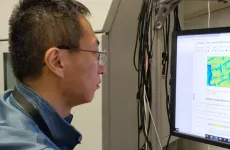(Press-News.org) Children born in October are both more likely to be vaccinated against influenza and least likely to be diagnosed with influenza compared with children born in other months, finds a US study published by The BMJ today.
The results suggest that birth month is associated with both timing of flu vaccination and the likelihood of a flu diagnosis - and that October is the optimal time for young children to have a flu shot, in line with current recommendations.
Annual influenza vaccination is particularly important for young children, who are at higher risk of flu and severe infection requiring admission to hospital. Vaccination is recommended during September or October to maximise immunity during the peak flu season.
Among young children in the United States, preventive care visits tend to occur during birth months and are a convenient time to receive the influenza vaccine, but large scale studies of the optimal timing of vaccination are unavailable.
To address this, researchers set out to assess the optimal timing of influenza vaccination in young children.
Using health insurance claims data, they identified over 800,000 children aged 2-5 years who received an influenza vaccination between 1 August and 31 January during 2011-18. They then analysed rates of diagnosed influenza among these children by birth month.
After accounting for a range of potentially influential factors such as age, sex, existing conditions, healthcare use and family size, the results show that October was the most common month for children to be vaccinated.
Children born in October also had the lowest rate of influenza diagnosis. For example, among children born in August, the average rate of influenza diagnosis across flu seasons studied was 3% compared with 2.7% for children born in October and 2.9% for those born in December.
This is an observational study and the authors acknowledge that their findings are limited to insured children who received medical care. Nor can they rule out the possibility that other unmeasured factors may have influenced their results.
Nevertheless, results were similar after additional analyses to evaluate whether the relation between birth month and influenza risk was due to chance, providing greater confidence in their conclusions.
“Our findings suggest that US public health interventions focused on vaccination of young children in October may yield the best protection in typical flu seasons,” they say.
“The study’s findings are consistent with current recommendations promoting October vaccination,” they add.
[Ends]
END
Children born in October least likely to get flu
Results suggest October is the best time for young children to have annual flu shot
2024-02-22
ELSE PRESS RELEASES FROM THIS DATE:
Uptake of HIV prevention medication doubles with mix of digital health interventions, study finds
2024-02-22
UNDER EMBARGO UNTIL 6:30 PM EST, Feb. 21, 2024
A UCLA Health-led study found a combination of interventions of one-on-one telehealth coaching, peer support forums, and automated text messages more than doubled the use of the HIV prevention strategy, called PrEP, among younger, at-risk Americans, a group that historically has had low use of the medication.
The randomized controlled trial results, published in the journal Lancet Digital Health, tested combinations of interventions to improve HIV prevention behaviors, including pre-exposure prophylaxis, or PrEP, among younger Americans who have historically ...
Seaports are hotspots of contagious cancer in mussels
2024-02-22
Seaports act as hubs for the global spread of MtrBTN2,1 a rare contagious cancer affecting mussels. In this disease, cancer cells can be transmitted, like parasites, from one mussel to another nearby. While, in nature, such contagion mainly occurs between mussels in the same bed, ports and maritime transport facilitate the spread of MtrBTN2 to other locations, through biofouling, whereby diseased mussels attach themselves to ship hulls. This finding, the fruit of research by a team led by scientists from the CNRS and the University of Montpellier,2 will be published in Proceedings of the Royal Society B ...
Cancer leaders pens "letter to the world" calling for urgent investment as global cancer cases predicted to rise
2024-02-22
In their ‘letter to the world’ they say that cancer is a ‘defining health issue of our time’ that requires a united and collective worldwide response on a par with Covid-19. The scientists argue that we’re at a ‘tipping point’ that could transform how we understand and treat cancer – but more support for life-saving research is required to beat the disease.
The letter is published as Cancer Research UK launched its More Research, Less Cancer campaign ...
Researchers use machine learning to predict how ingested drugs will interact with transport proteins
2024-02-22
Before orally administered drugs can make their way throughout the body, they must first bind to membrane proteins called drug transporters, which carry compounds across the intestinal tract and help them reach their intended targets. But because one drug can bind to several different drug transporters, they may struggle to get past this gut barrier, potentially leading to decreased drug absorption and efficacy. If another drug is added to the mix, interactions between the two compounds and their transporters can cause dangerous side effects.
Researchers ...
New detection method aims to warn of landslide tsunamis
2024-02-22
University of Alaska Fairbanks researchers have devised a way to remotely detect large landslides within minutes of occurrence and to quickly determine whether they are close to open water and present a tsunami hazard.
They write in a new paper that their method of determining a landslide’s location, volume and potential impact is rapid enough to support the National Oceanic and Atmospheric Administration’s goal of issuing a tsunami warning within 5 minutes of a landslide.
“The warming climate is causing glaciers to retreat, leaving behind valleys whose mountainsides and hillsides have lost their ...
Little groundwater recharge in ancient Mars aquifer, according to new models
2024-02-22
Mars was once a wet world. The geological record of the Red Planet shows evidence for water flowing on the surface – from river deltas to valleys carved by massive flash floods.
But a new study shows that no matter how much rainfall fell on the surface of ancient Mars, very little of it seeped into an aquifer in the planet’s southern highlands.
A graduate student at The University of Texas at Austin made the discovery by modeling groundwater recharge dynamics for the aquifer using a range of methods ...
Human-AI coworking
2024-02-21
Though artificial intelligence decreases human error in experimentation, human experts outperform AI when identifying causation or working with small data sets.
To capitalize on AI and researcher strengths, ORNL scientists, in collaboration with colleagues at National Cheng Kung University, Taiwan, and the University of Tennessee, Knoxville, developed a human-AI collaboration recommender system for improved experimentation performance.
During experiments, the system’s machine learning algorithms, described in npj Computational Materials, display preliminary ...
Vlasov and Bashir groups develop nanoscale device for brain chemistry analysis
2024-02-21
Longstanding challenges in biomedical research such as monitoring brain chemistry and tracking the spread of drugs through the body require much smaller and more precise sensors. A new nanoscale sensor that can monitor areas 1,000 times smaller than current technology and can track subtle changes in the chemical content of biological tissue with sub-second resolution, greatly outperforming standard technologies.
The device, developed by researchers at the University of Illinois Urbana-Champaign, is silicon-based and takes advantage of techniques developed for microelectronics manufacturing. ...
MD Anderson researchers receive over $25.5 million in CPRIT funding
2024-02-21
HOUSTON ― The University of Texas MD Anderson Cancer Center today was awarded 16 grants totaling over $25.5 million from the Cancer Prevention and Research Institute of Texas (CPRIT) in support of cancer screening, early detection and prevention programs, faculty recruitment, and groundbreaking cancer research across all areas of the institution.
“We are grateful for CPRIT’s continued funding of impactful cancer research and prevention programs at MD Anderson, which propels our efforts to deliver new breakthroughs and to advance our mission to end cancer,” said Peter WT Pisters, M.D., president of MD Anderson. “These efforts are pivotal to our institutional strategy ...
Hippo signaling pathway gives new insight into systemic sclerosis
2024-02-21
Systemic sclerosis causes the skin to tighten and harden resulting in a potentially fatal autoimmune condition that is associated with lung fibrosis and kidney disease.
University of Michigan Health researchers have studied the pathology of systemic sclerosis to understand better the disease and identify key pathways in the disease process that can be targeted therapeutically.
A research team led by University of Michigan Health’s Dinesh Khanna, M.B.B.S., M.Sc., professor of rheumatology and Johann Gudjonsson, M.D., Ph.D., professor of dermatology, ...
LAST 30 PRESS RELEASES:
One strategy to block both drug-resistant bacteria and influenza: new broad-spectrum infection prevention approach validated
Survey: 3 in 4 skip physical therapy homework, stunting progress
College students who spend hours on social media are more likely to be lonely – national US study
Evidence behind intermittent fasting for weight loss fails to match hype
How AI tools like DeepSeek are transforming emotional and mental health care of Chinese youth
Study finds link between sugary drinks and anxiety in young people
Scientists show how to predict world’s deadly scorpion hotspots
ASU researchers to lead AAAS panel on water insecurity in the United States
ASU professor Anne Stone to present at AAAS Conference in Phoenix on ancient origins of modern disease
Proposals for exploring viruses and skin as the next experimental quantum frontiers share US$30,000 science award
ASU researchers showcase scalable tech solutions for older adults living alone with cognitive decline at AAAS 2026
Scientists identify smooth regional trends in fruit fly survival strategies
Antipathy toward snakes? Your parents likely talked you into that at an early age
Sylvester Cancer Tip Sheet for Feb. 2026
Online exposure to medical misinformation concentrated among older adults
Telehealth improves access to genetic services for adult survivors of childhood cancers
Outdated mortality benchmarks risk missing early signs of famine and delay recognizing mass starvation
Newly discovered bacterium converts carbon dioxide into chemicals using electricity
Flipping and reversing mini-proteins could improve disease treatment
Scientists reveal major hidden source of atmospheric nitrogen pollution in fragile lake basin
Biochar emerges as a powerful tool for soil carbon neutrality and climate mitigation
Tiny cell messengers show big promise for safer protein and gene delivery
AMS releases statement regarding the decision to rescind EPA’s 2009 Endangerment Finding
Parents’ alcohol and drug use influences their children’s consumption, research shows
Modular assembly of chiral nitrogen-bridged rings achieved by palladium-catalyzed diastereoselective and enantioselective cascade cyclization reactions
Promoting civic engagement
AMS Science Preview: Hurricane slowdown, school snow days
Deforestation in the Amazon raises the surface temperature by 3 °C during the dry season
Model more accurately maps the impact of frost on corn crops
How did humans develop sharp vision? Lab-grown retinas show likely answer
[Press-News.org] Children born in October least likely to get fluResults suggest October is the best time for young children to have annual flu shot




